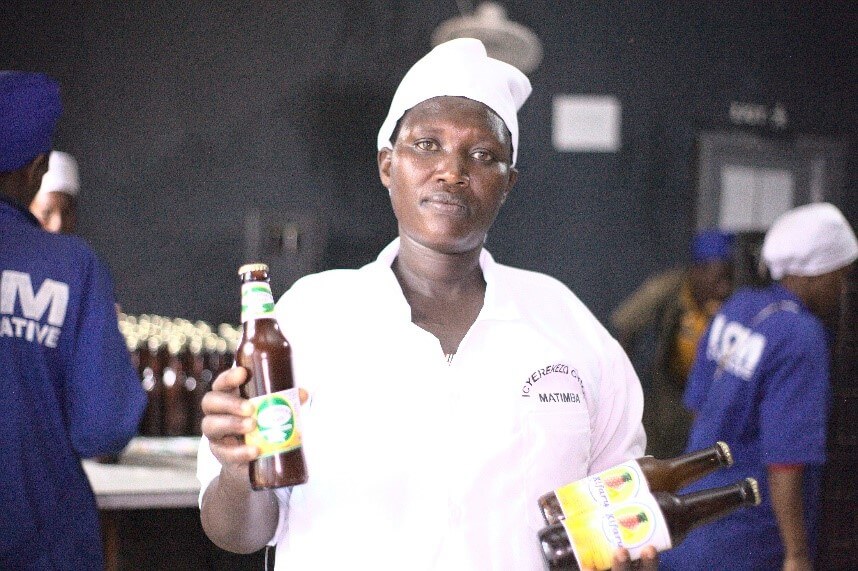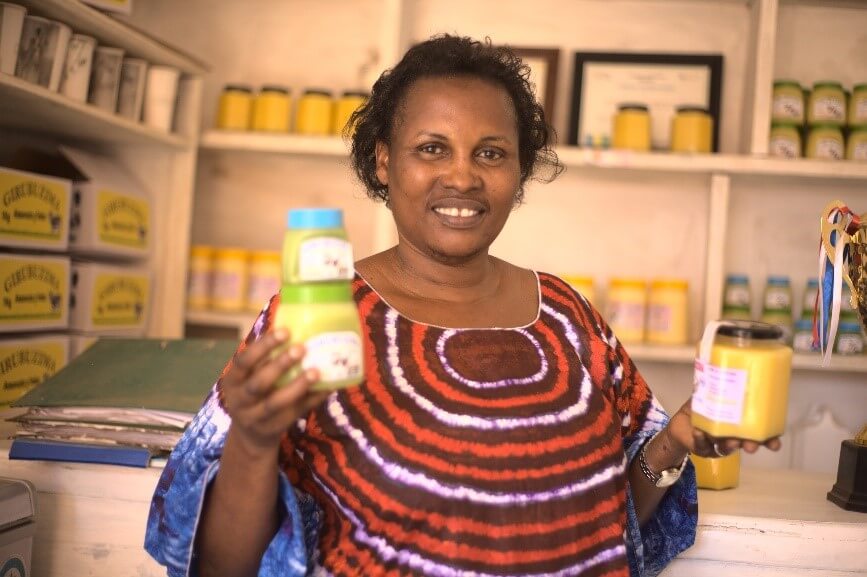Growing up in Nyagatare, Rwanda, Rosette Cyarikora’s childhood memories are replete with the sight of her mother skilfully producing ghee. This led her to recognise its potential for creating a sustainable family income. When she came of age, Rosette along with her friends, began packaging and selling ghee across the border in Uganda. Despite their entrepreneurial spirit, they faced legal challenges and confiscations of their merchandise, due to operating across the border without the requisite authorisation. However, their determination persisted.
Their perseverance paid off when in 2016, they were introduced to the “Making Trade Work for Women” programme, launched by Pro-Femmes/Twese Hamwe, TradeMark Africa, and funded by Global Affairs Canada (GAC). This initiative, sought to empower women entrepreneurs and foster an inclusive business environment.
As part of the programme, Rosette and 19 other women formed the Girubuzima Cooperative. With the programme’s support, they expanded their product line to include ghee, buttermilk, and skin cream. Starting with just a litre of milk each and sheer determination, the cooperative thrived and by 2019, they were processing over 300 litres of milk weekly and selling fresh milk and dairy products in a bustling shop near a busy bus terminal. Thanks to the programme’s market linkages, they now export their products to Uganda, and were recently recognised and awarded a trophy for their innovation in dairy products, packaged in attractive, recyclable containers. Looking to the future, the women of Girubuzima are saving funds to purchase land and construct a factory, aiming to expand their production capabilities.

Nearby, a local restaurant proudly serves Kifaru ginger beer, a product processed in Nyagatare District by the Icyerekezo Cyiza Women’s Cooperative, comprising of 16 women, who specialise in processing juices and alcoholic beverages from local fruits. Despite initial setbacks, including confiscated products due to regulatory issues, they persevered and eventually gained essential certifications with Pro-Femmes/Twese Hamwe’s assistance. Additionally, the programme facilitated their introduction to regional markets through trade exhibitions. The cooperative aspires to modernise their facility and expand production, including launching their ginger beer in Uganda. “We were poor. We could barely feed, clothe ourselves or pay school fees for our children because our goods and money would get seized at the border. Now, all that has changed. We now not only feed our own, but we are also feeding many others,” Jeanette, the president of Icyerekezo Cyiza.
TradeMark Africa and Pro-Femmes/Twese Hamwe have also equipped women-led enterprises with necessary tools for trade. For instance, Ushoni Wanguo, a group of about 25 former informal traders, now excels in dressmaking, beadwork, and weaving, thanks to new equipment. “Pro-Femmes provided us with three advanced electric sewing machines capable of embroidery,” shared Elevania Mukakamanda, president of the cooperative. The training in financial management they received has enabled them to proficiently manage their accounts and comply with the Rwanda Revenue Authority (RRA)’s regulations.
The Nyagatare District recognised these cooperatives impacts, providing loans to Ushoni Wanguo and Girubuzima, to further support their growth. These cooperatives are also collaborating with the district to educate more women about the benefits of joining cooperatives.
The “Making Trade Work for Women” programme was structured around three pillars: refining trade regulations, formalising businesses, and promoting women’s rights. The programme has empowered over 100 cooperatives, encompassing over 6,000 women, increasing their capital by almost ten-fold in 2019 per cooperative and reducing gender-based violence, as each cooperative formed a committee to tackle such issues.
The establishment of trade cooperatives has emerged as a key strategy in fostering successful cross-border businesses. The programme’s first phase, which concluded in 2019, illustrates the vital role of legal and economic support structures in aiding small businesses and transforming their economic landscape. The programme is now progressing into its second phase under TradeMark Africa’s Strategy 3.















